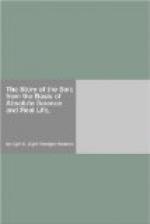Percy stepped to his little homemade bookcase and took a volume from the Lincoln set.
“May I read you some words of Lincoln?” he asked.
“Oh yes,” she answered wonderingly.
“On September 30th, 1859,” said Percy, “Lincoln gave an address at Milwaukee, before the State Agricultural Society of Wisconsin, and of all the addresses of Lincoln it seems to me that this is the greatest, because it deals with the greatest material problem of the United States. I think I have scarcely heard a public address in which the speaker has not dwelt upon the fact that the farmer must feed and clothe the world; and it seems to me that the missionaries always speak of the famines and starvation of so many people in India and other old countries. Do you remember the lecture by the medical missionary? Well, would it not he better to send agricultural missionaries to India and China to teach those people how to raise crops?
“I have read and reread this address more than any other in the Lincoln set. Let me read you some of the paragraphs I have marked.
“After making some introductory remarks about the value of agricultural fairs, Lincoln began his address as follows:
“’I presume I am not expected to employ the time assigned me in the mere flattery of the farmers as a class. My opinion of them is that, in proportion to numbers, they are neither better nor worse than other people. In the nature of things they are more numerous than any other class; and I believe there are really more attempts at flattering them than any other, the reason of which I cannot perceive, unless it be that they can cast more votes than any other. On reflection, I am not quite sure that there is not cause of suspicion against you in selecting me, in some sort a politician and in no sort a farmer, to address you.
“’But farmers being the most numerous class, it follows that their interest is the largest interest. It also follows that that interest is most worthy of all to be cherished and cultivated—that if there be inevitable conflict between that interest and any other, that other should yield.
“’Again, I suppose that it is not expected of me to impart to you much specific information on agriculture. You have no reason to believe, and do not believe, that I possess it; if that were what you seek in this address, any one of your own number or class would be more able to furnish it. You, perhaps, do expect me to give some general interest to the occasion, and to make some general suggestions on practical matters. I shall attempt nothing more. And in such suggestions by me, quite likely very little will be new to you, and a large part of the rest will be possibly already known to be erroneous.
“’My first suggestion is an inquiry as to the effect of greater thoroughness in all the departments of agriculture than now prevails in the Northwest—perhaps I might say in America. To speak entirely within bounds, it is known that fifty bushels of wheat, or one hundred bushels of Indian corn, can be produced from an acre.’”




